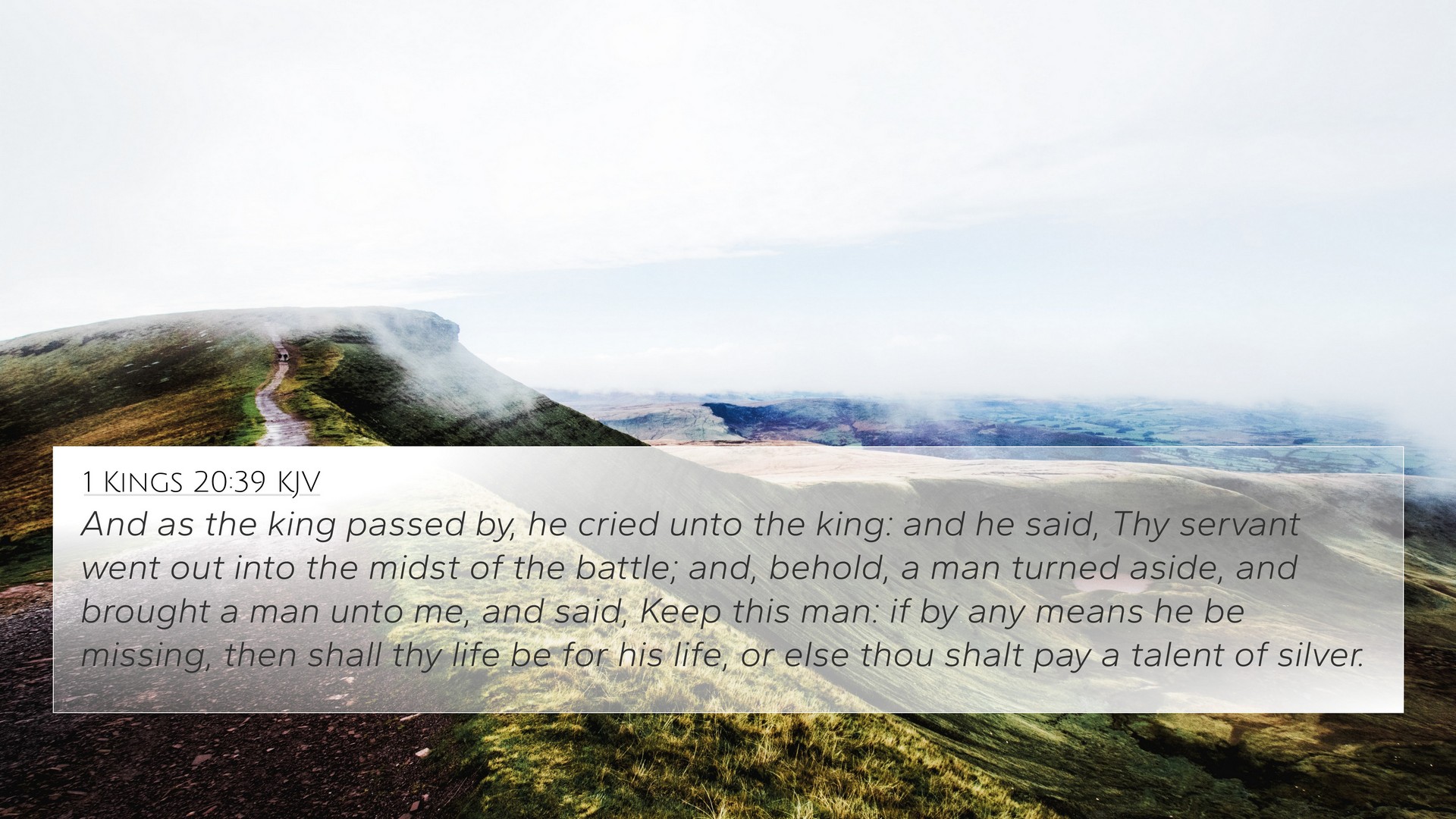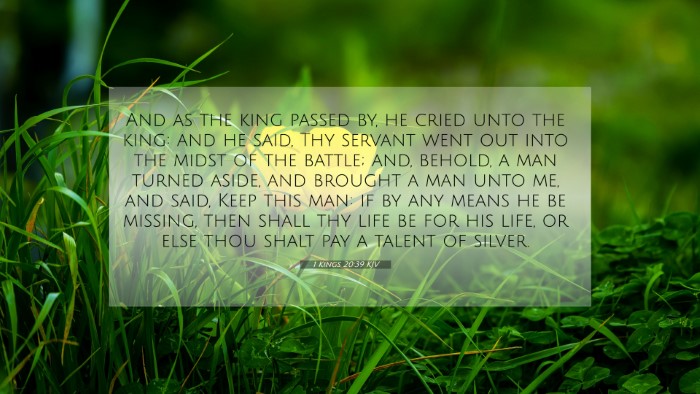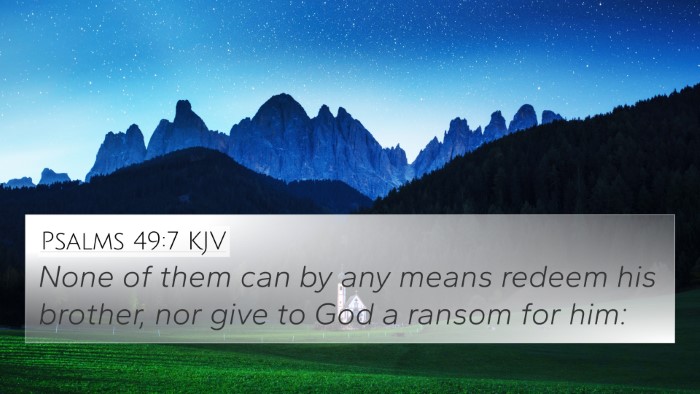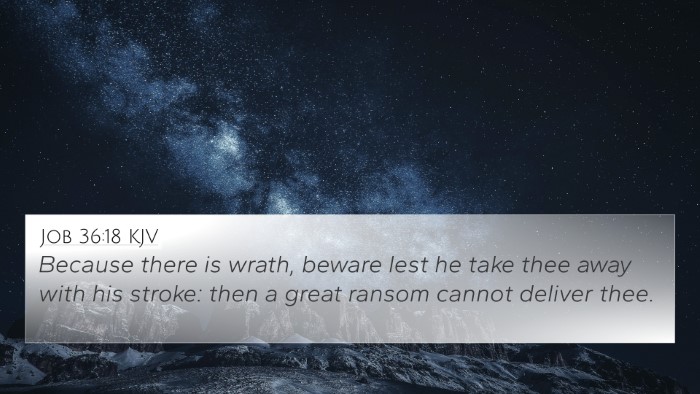Understanding 1 Kings 20:39
Bible Verse: 1 Kings 20:39 - "And as the king passed, he cried unto the king; and he said, Thy servant went out into the midst of the battle; and, behold, a man turned aside, and brought a man unto me, and said, Keep this man: if by any means he be missing, then shall thy life be for his life, or else thou shalt pay a talent of silver."
Verse Meaning and Interpretation
The verse depicts a critical moment during a battle where a servant, portrayed as a king's messenger, reports an urgent message about a captured soldier. This figure represents the tensions and moral dilemmas faced in warfare.
Commentary Insights
-
Matthew Henry:
Henry highlights the dynamics of obligation and sacrifice in the context of war. The messenger symbolizes the broader theme of accountability and the severe consequences of failure. This narrative serves as both a cautionary reflection on the weight of one's responsibilities and an illustration of personal sacrifice for the welfare of others.
-
Albert Barnes:
Barnes reflects on the interplay between authority and personal integrity, emphasizing that the king's life is at stake due to the negligence of the messenger. The gravity of the situation illustrates the principles of justice and the moral imperatives that govern authority figures during conflict.
-
Adam Clarke:
Clarke points out the stark implications of the command given to the messenger to guard the captured man. He interprets this as a deep moral lesson: the cost of failing one's duty can be devastating and may require immense personal sacrifice. Clarke also draws attention to how this verse foreshadows themes of divine justice and redemption.
Thematic Bible Verse Connections
This verse connects to several overarching themes in the Bible, particularly concerning duty, sacrifice, and accountability:
- 1 Samuel 15:22: "To obey is better than sacrifice" highlights the importance of fulfilling one’s duty over merely providing compensation for failure.
- Luke 12:48: "For unto whomsoever much is given, of him shall be much required," illustrating the weight of responsibility that comes with power and privilege.
- Matthew 25:30: "Cast ye the unprofitable servant into outer darkness," emphasizing the fate that befalls those who neglect their duties.
- Galatians 6:5: "For every man shall bear his own burden," which stresses individual responsibility and accountability.
- James 4:17: "Therefore to him that knoweth to do good, and doeth it not, to him it is sin," highlighting moral culpability for failing in one's obligations.
- Proverbs 21:3: "To do justice and judgment is more acceptable to the Lord than sacrifice," reinforcing the primacy of moral actions over ritualistic compliance.
- Ephesians 6:8: "Knowing that whatsoever good thing any man doeth, the same shall he receive of the Lord," connecting duty with divine recompense.
Contextual Analysis
This narrative unfolds in the context of Israel's battles against Syria, emphasizing the serious stakes involved in warfare and the human element intertwined with it. The tension between the king's authority and the responsibilities of his subordinates reflects broader theological themes about leadership and divine oversight.
Cross-Referencing Biblical Texts
To better understand the implications of 1 Kings 20:39, consider these cross-references:
- 2 Samuel 11:17: The consequences of betrayal and the cost of duty.
- Mark 10:45: Jesus illustrates servanthood, relating it to the theme of sacrifice for others.
- 3 John 1:11: The importance of good conduct in a Christian community.
- Hebrews 13:17: Authority and accountability for leaders in spiritual matters.
Conclusion
In essence, 1 Kings 20:39 serves as a poignant reminder that the consequences of our responsibilities often extend beyond ourselves. The themes of duty, sacrifice, and accountability highlight the moral frameworks through which individuals are called to navigate their lives, particularly in contexts of authority and communal well-being.
In studying this verse, one may utilize tools for Bible cross-referencing to delve deeper into its thematic connections with other scriptures, thus enriching one's understanding and application of biblical doctrines.














